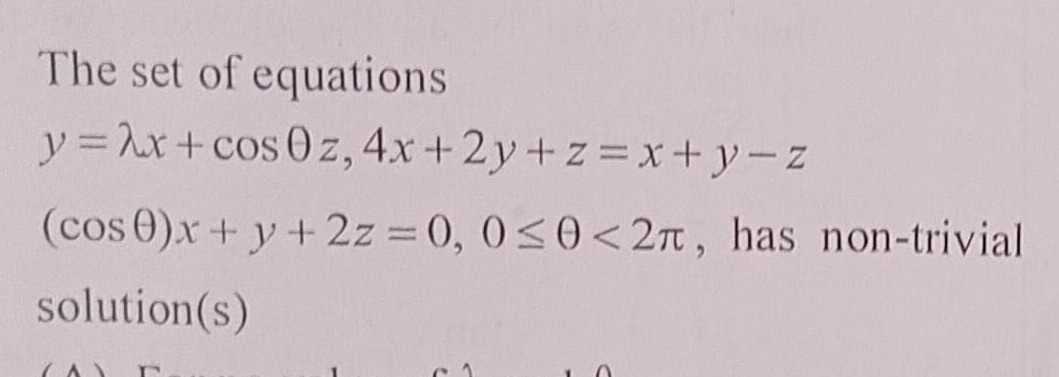Question
Question: The set of equations $y = \lambda x + \cos \theta z, 4x + 2y + z = x + y - z$ $(\cos \theta)x + y + ...
The set of equations y=λx+cosθz,4x+2y+z=x+y−z (cosθ)x+y+2z=0,0≤θ<2π, has non-trivial solution(s)

No non-trivial solutions
Solution
To determine if the given system of linear equations has non-trivial solutions, we first need to write the equations in the standard homogeneous form Ax+By+Cz=0.
The given equations are:
- y=λx+cosθz
- 4x+2y+z=x+y−z
- (cosθ)x+y+2z=0
Rewrite them in the standard form:
- λx−y+(cosθ)z=0
- 4x−x+2y−y+z−(−z)=0⇒3x+y+2z=0
- (cosθ)x+y+2z=0
Now, form the coefficient matrix A for this homogeneous system: A=λ3cosθ−111cosθ22
For a homogeneous system of linear equations to have non-trivial solutions, the determinant of the coefficient matrix must be zero, i.e., det(A)=0.
Calculate the determinant of A: det(A)=λ1122−(−1)3cosθ22+(cosθ)3cosθ11
det(A)=λ(1⋅2−2⋅1)+1(3⋅2−2⋅cosθ)+(cosθ)(3⋅1−1⋅cosθ)
det(A)=λ(2−2)+(6−2cosθ)+(3cosθ−cos2θ)
det(A)=λ(0)+6−2cosθ+3cosθ−cos2θ
det(A)=6+cosθ−cos2θ
Now, set the determinant to zero to find the conditions for non-trivial solutions: 6+cosθ−cos2θ=0
Multiply by -1 to rearrange the terms into a standard quadratic form: cos2θ−cosθ−6=0
Let u=cosθ. The equation becomes a quadratic equation in u: u2−u−6=0
Factorize the quadratic equation: (u−3)(u+2)=0
This gives two possible values for u: u=3 or u=−2
Substitute back u=cosθ: cosθ=3 or cosθ=−2
However, the range of the cosine function for real values of θ is [−1,1]. That is, −1≤cosθ≤1. Neither cosθ=3 nor cosθ=−2 falls within this valid range.
Since there are no real values of θ for which cosθ=3 or cosθ=−2, the determinant det(A) is never equal to zero for any real θ.
Therefore, the system of equations never has non-trivial solutions. It only possesses the trivial solution (x=0,y=0,z=0).
